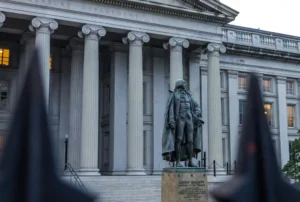
August 6, 2017; Politico and Truthout
The leadership of Citizens for Responsibility and Ethics in Washington (CREW) rejoiced on Friday when a US District Court judge’s ruling invalidated a Federal Election Commission regulation that has allowed donors to dark money groups (and others) to remain anonymous. The impact on campaign finance reform and on the many 501c4 nonprofits who have populated this arena could be huge. Brent D. Griffiths at Politico writes,
Judge Beryl A. Howell ruled the FEC’s current regulation of such groups, including 501c4 nonprofits, fails to uphold the standard Congress intended when it required the disclosure of politically related spending.
“The challenged regulation facilitates such financial ‘routing,’ blatantly undercuts the congressional goal of fully disclosing the sources of money flowing into federal political campaigns, and thereby suppresses the benefits intended to accrue from disclosure,” wrote Howell, an Obama appointee to the DC district court. The decision is likely to be appealed.
The suit was brought by CREW against the Federal Elections Commission after Crossroads GPS, a 501c4 offshoot of Karl Rove’s Crossroads Super PAC, would not disclose donors after spending $6 million in an unsuccessful campaign to defeat Ohio Democratic Senator Sherrod Brown in 2012. With this ruling, those donors will no longer be anonymous. It may mean that any donor giving more than $200 to a nonprofit to influence a federal election would need to be disclosed.
What happens from here will be important. The FEC will need to write new regulations based on this ruling, and the public will know just who is giving funds to influence an election. Within the next 45 days, the FEC must produce interim regulations that will support this broader disclosure standard. The FEC also has 30 days to reconsider its original decision to dismiss a complaint about Crossroads GPS’s spending in Ohio, which precipitated this lawsuit and was disputed within the FEC.
Sign up for our free newsletters
Subscribe to NPQ's newsletters to have our top stories delivered directly to your inbox.
By signing up, you agree to our privacy policy and terms of use, and to receive messages from NPQ and our partners.
In order to appeal the decision of the court, the FEC needs a unanimous vote of all the commissioners remaining (there are two vacancies). It is unlikely to get that vote, given the Commission includes some members who are pleased with this court outcome. Crossroads could also file an appeal, which is more likely.
This. Is. Huge.
It’s hard to exaggerate how big of a deal this @CREWcrew victory is. If it stands, it could fundamentally change the role dark money plays in elections (if it has a role at all). https://t.co/OKftf17I7f
— Robert Maguire (@RobertMaguire_) August 4, 2018
Responding to the importance of this decision on Twitter, Robert Maguire from the Center for Responsive Politics said it “could fundamentally change the role dark money plays in elections (if it has a role at all).” Continuing his Twitter exchange with CREW Executive Director Noah Bookbinder, Maguire added, “Consider that dark money groups have spent more than $733 MILLION (!) on independent expenditures—the type of spending the case was concerned with—since Citizens United. A huge portion of their activity.”
The Citizens United decision gave birth to a plethora of “social welfare nonprofits” bankrolling funds from anonymous donors for use in campaigns for federal elections. This ruling puts a dent in the secrecy that surrounds some of the organizations that came from that ruling. Will it hold up on appeal? Will it cut down on the vast sums of money that are spent on these campaigns? As we look down the road to the not-too-distant mid-term elections, and to those that will follow, perhaps a statement from Bookbinder is appropriate: “Major donors are now on notice that if they contribute to politically active 501c4 organizations, their contributions will have to be disclosed and if they are not, CREW will pursue enforcement cases with the FEC and, if necessary, in court.”—Carole Levine












